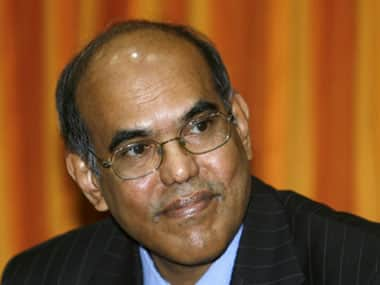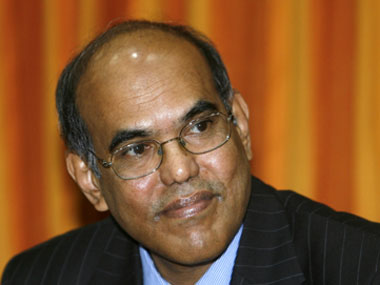With just about a week to go before the annual monetary policy review on 17 April, Reserve Bank of India (RBI) Governor D Subbarao must be a lonely man.
The pressure is intense from all quarters - the finance ministry, businessmen, and markets - to cut interest rates. But there is almost no single indicator that gives comfort to warrant such a move.
Inflation isn’t under control. The Wholesale Prices Index number (just under 7 percent at last count), due to be released on 13 April, will be a very crucial number to watch. The Consumer Price Index is already close to 9 percent.
[caption id=“attachment_271187” align=“alignleft” width=“380” caption=“RBI’s hands are so tied that no matter what it does it will create a problem for the economy. Reuters”]
 [/caption]
[/caption]
The rupee is ruling weak and could grow weaker. On Tuesday, it was quoting at 51.26 to the US dollar, and it does not have a reason to trend better against the greenback given a record, near-4 percent current account deficit (CAD) in 2011-12.
The main reason: imports are rising faster than exports. In February, exports grew at an anaemic 4.3 percent and imports at 20.6 percent. The 11-month trade deficit (April 2011-February 2012) was a huge $166.7 billion. India is simply consuming too much.
Not surprisingly, foreign exchange reserves are falling. From a year ago, foreign currency assets have fallen by $15 billion. But for increasing borrowings and non-resident deposits (borrowings of another kind), the foreign exchange reserves would have dropped even more sharply.
Liquidity is tight. Despite two sharp cuts in banks’ cash reserve ratio by 1 percent that freed up Rs 80,000 crore this year, banks are still borrowing over Rs 1,06,000 crore daily from the RBI through the repo window.
And, to top it all, the government is borrowing and borrowing and borrowing. A huge Rs 3,70,000 crore is to be borrowed between April to September, which is an average of Rs 14,230 crore every week. Banks have no appetite to borrow. At the 6 April auction of government bonds, a significant chunk devolved on dealers.
What all these signals are telling us is this: there is a case for an increase in interest rates, not any cut.
In fact, the RBI’s hands are so tied that no matter what it does it will create a problem for the economy.
For example, in February the central bank bought dollars not because there was an excess of the stuff coming in, but because it needed to inject money into the system.
According to BusinessLine , the RBI bought $1.11 billion from the market and sold $1.43 billion in February - the first time it has purchased dollars since November 2010. Now why would a central bank buy dollars and push the rupee down when there is already enough demand for dollars?
The answer is liquidity. To keep the rupee stable when oil prices are so high and imports are growing faster than exports, the RBI has to sell dollars. But when it sells dollars, an equivalent amount of rupee resources gets mopped up.
Net result: tighter liquidity. Tight liquidity, when it continues for months on end, is a signal for raising rates, not cutting them. By selling dollars, the RBI was trying to ease liquidity. It was not trying to tell us that the rupee should rise against the dollar.
Tight rupee liquidity, a falling rupee, and dwindling reserves call for higher rates to stem the rot.
As SS Tarapore , former RBI Deputy Governor, noted: “If the RBI is to pull itself out of the quagmire it would need to raise the repo rate from its present level of 8.5 percent to 9.5 percent.”
Now you know why Subbarao is a lonely man. To fight the tide of overblown expectations on a rate cut, when the macro numbers are telling him to do the opposite, he will have to hold rates.
He is not going to be the most popular gent around for a while.
)